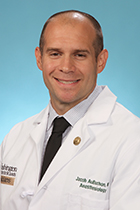 The Pain Management Clinic at St. Louis Children’s Hospital (SLCH) provides evaluation, treatment, education and support for pediatric patients experiencing either acute or chronic pain. It is the only clinic in the region offering these specialized services through providers with particular training in helping children deal with pain.
The Pain Management Clinic at St. Louis Children’s Hospital (SLCH) provides evaluation, treatment, education and support for pediatric patients experiencing either acute or chronic pain. It is the only clinic in the region offering these specialized services through providers with particular training in helping children deal with pain.
“Generally, children with either acute or chronic pain are an underserved population because it is not an area well understood across the medical field,” says Washington University physician Jacob AuBuchon, MD, pediatric anesthesiologist and SLCH director of pain management. “Usually pain in children isn’t a critical issue because they are robust and recover faster after surgery than adults. But when pain exists, it can affect every aspect of a child’s life. Our goal is to provide options that control pain and provide coping strategies that allow children living with pain to function as normally as possible.”
Dr. AuBuchon completed an adult pain management and pediatric anesthesia fellowship at Washington University School of Medicine. In addition, he received pediatric pain management training at Cincinnati Children’s Hospital Medical Center.
“Pediatric pain management has always been a particular interest of mine because of its complex nature and the opportunity to change the trajectory of a young life. Especially for children with chronic pain, validating their concerns and those of their family means taking time to educate them about pain mechanisms and management and providing the motivation and empowerment so that pain doesn’t destroy their lives,” says Dr. AuBuchon. “We provide them with tools they can use to improve their quality of life through a multidisciplinary approach that may include medications, physical therapy and cognitive behavioral strategies.”
In addition to Dr. AuBuchon’s expertise, the chronic pain management team includes a pain psychologist, physical therapist with special training in pain disorders, and nurse practitioners with specialized pain management certification. For children with chronic pain, the team’s first goal is to return function.
“Many of these children experience anxiety and mood changes, have missed a lot of school and are dealing with complicated family dynamics that contribute to their stress,” explains Dr. AuBuchon. “Cognitive therapies to help deal with stress, improve sleep, modify behavior, reintegrate to normal activities and make plans for returning to school are all essential to treatment.”
Medications for pain control also may be prescribed, although they are adjuvant medicines to relax muscles or reduce nerve pain rather than opioids. Management and counseling for anxiety and depression and physical therapy for strengthening are also important parts of the treatment plan.
“In addition, we have a program called Commit, which is available to children at high risk for having significant delays in their education and development,” says Dr. AuBuchon. “These are children who have been out of school for a significant length of time, who have been bedridden for extended periods, and who have abnormal sleep cycles.”
The Commit program offers these patients intense, frequent sessions emphasizing both physical therapy and psychological counseling that aims to place them on a path toward improvement.
“For many of these children, the reality is that their pain is not going to go away quickly. We need to determine ways in which they can adjust their lives in order for them to remain functional,” says Dr. AuBuchon.
Vital to these children’s success is the commitment of parents. The chronic pain team educates parents regarding home exercise programs and medication adherence and offers counseling when needed.
“Sometimes parents may have lost their authoritative role because their compassion has made them lenient in matters such as letting their children miss school frequently,” says Dr. AuBuchon. “We help them learn how to say, ‘OK, we know you’re in pain but you need to go to school,’ while providing the strategies that will help children attain that goal and others in their lives.”
Children with pain resulting from injuries or surgeries are cared for by an acute pain management team with more than 20 years of experience managing pediatric patients. Although opioids may be prescribed in this acute setting, focus is shifting to administering nerve blocks and epidurals to promote faster recovery with fewer complications.
“We now know that by controlling acute surgical pain, we reduce the risk of persistent pain in the months after the operations,” says Dr. AuBuchon.
Potential clues that may indicate children are experiencing chronic pain are factors such as pain persisting for three or more months, missing school weekly or a few times a month, regularly leaving school early, disrupted sleep patterns or not participating in normal school activities or sports.
“Chronic pain red flags usually have to do with the social aspects of children’s lives and their functionality,” he says. “These children should be referred to the clinic sooner rather than later so that through proper diagnosis and treatment they may remain active and engaged in their lives.”
For more information about the pain management clinic or to refer a patient, call Children’s Direct at 800.678.HELP (4357).










